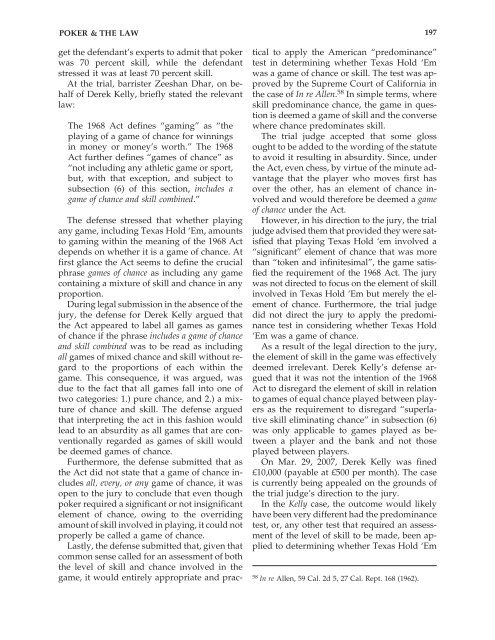Poker and the Law - Economics of Casino Gambling
Poker and the Law - Economics of Casino Gambling
Poker and the Law - Economics of Casino Gambling
Create successful ePaper yourself
Turn your PDF publications into a flip-book with our unique Google optimized e-Paper software.
POKER & THE LAW 197<br />
get <strong>the</strong> defendant’s experts to admit that poker<br />
was 70 percent skill, while <strong>the</strong> defendant<br />
stressed it was at least 70 percent skill.<br />
At <strong>the</strong> trial, barrister Zeeshan Dhar, on behalf<br />
<strong>of</strong> Derek Kelly, briefly stated <strong>the</strong> relevant<br />
law:<br />
The 1968 Act defines “gaming” as “<strong>the</strong><br />
playing <strong>of</strong> a game <strong>of</strong> chance for winnings<br />
in money or money’s worth.” The 1968<br />
Act fur<strong>the</strong>r defines “games <strong>of</strong> chance” as<br />
“not including any athletic game or sport,<br />
but, with that exception, <strong>and</strong> subject to<br />
subsection (6) <strong>of</strong> this section, includes a<br />
game <strong>of</strong> chance <strong>and</strong> skill combined.”<br />
The defense stressed that whe<strong>the</strong>r playing<br />
any game, including Texas Hold ‘Em, amounts<br />
to gaming within <strong>the</strong> meaning <strong>of</strong> <strong>the</strong> 1968 Act<br />
depends on whe<strong>the</strong>r it is a game <strong>of</strong> chance. At<br />
first glance <strong>the</strong> Act seems to define <strong>the</strong> crucial<br />
phrase games <strong>of</strong> chance as including any game<br />
containing a mixture <strong>of</strong> skill <strong>and</strong> chance in any<br />
proportion.<br />
During legal submission in <strong>the</strong> absence <strong>of</strong> <strong>the</strong><br />
jury, <strong>the</strong> defense for Derek Kelly argued that<br />
<strong>the</strong> Act appeared to label all games as games<br />
<strong>of</strong> chance if <strong>the</strong> phrase includes a game <strong>of</strong> chance<br />
<strong>and</strong> skill combined was to be read as including<br />
all games <strong>of</strong> mixed chance <strong>and</strong> skill without regard<br />
to <strong>the</strong> proportions <strong>of</strong> each within <strong>the</strong><br />
game. This consequence, it was argued, was<br />
due to <strong>the</strong> fact that all games fall into one <strong>of</strong><br />
two categories: 1.) pure chance, <strong>and</strong> 2.) a mixture<br />
<strong>of</strong> chance <strong>and</strong> skill. The defense argued<br />
that interpreting <strong>the</strong> act in this fashion would<br />
lead to an absurdity as all games that are conventionally<br />
regarded as games <strong>of</strong> skill would<br />
be deemed games <strong>of</strong> chance.<br />
Fur<strong>the</strong>rmore, <strong>the</strong> defense submitted that as<br />
<strong>the</strong> Act did not state that a game <strong>of</strong> chance includes<br />
all, every, or any game <strong>of</strong> chance, it was<br />
open to <strong>the</strong> jury to conclude that even though<br />
poker required a significant or not insignificant<br />
element <strong>of</strong> chance, owing to <strong>the</strong> overriding<br />
amount <strong>of</strong> skill involved in playing, it could not<br />
properly be called a game <strong>of</strong> chance.<br />
Lastly, <strong>the</strong> defense submitted that, given that<br />
common sense called for an assessment <strong>of</strong> both<br />
<strong>the</strong> level <strong>of</strong> skill <strong>and</strong> chance involved in <strong>the</strong><br />
game, it would entirely appropriate <strong>and</strong> prac-<br />
tical to apply <strong>the</strong> American “predominance”<br />
test in determining whe<strong>the</strong>r Texas Hold ‘Em<br />
was a game <strong>of</strong> chance or skill. The test was approved<br />
by <strong>the</strong> Supreme Court <strong>of</strong> California in<br />
<strong>the</strong> case <strong>of</strong> In re Allen. 58 In simple terms, where<br />
skill predominance chance, <strong>the</strong> game in question<br />
is deemed a game <strong>of</strong> skill <strong>and</strong> <strong>the</strong> converse<br />
where chance predominates skill.<br />
The trial judge accepted that some gloss<br />
ought to be added to <strong>the</strong> wording <strong>of</strong> <strong>the</strong> statute<br />
to avoid it resulting in absurdity. Since, under<br />
<strong>the</strong> Act, even chess, by virtue <strong>of</strong> <strong>the</strong> minute advantage<br />
that <strong>the</strong> player who moves first has<br />
over <strong>the</strong> o<strong>the</strong>r, has an element <strong>of</strong> chance involved<br />
<strong>and</strong> would <strong>the</strong>refore be deemed a game<br />
<strong>of</strong> chance under <strong>the</strong> Act.<br />
However, in his direction to <strong>the</strong> jury, <strong>the</strong> trial<br />
judge advised <strong>the</strong>m that provided <strong>the</strong>y were satisfied<br />
that playing Texas Hold ‘em involved a<br />
“significant” element <strong>of</strong> chance that was more<br />
than “token <strong>and</strong> infinitesimal”, <strong>the</strong> game satisfied<br />
<strong>the</strong> requirement <strong>of</strong> <strong>the</strong> 1968 Act. The jury<br />
was not directed to focus on <strong>the</strong> element <strong>of</strong> skill<br />
involved in Texas Hold ‘Em but merely <strong>the</strong> element<br />
<strong>of</strong> chance. Fur<strong>the</strong>rmore, <strong>the</strong> trial judge<br />
did not direct <strong>the</strong> jury to apply <strong>the</strong> predominance<br />
test in considering whe<strong>the</strong>r Texas Hold<br />
‘Em was a game <strong>of</strong> chance.<br />
As a result <strong>of</strong> <strong>the</strong> legal direction to <strong>the</strong> jury,<br />
<strong>the</strong> element <strong>of</strong> skill in <strong>the</strong> game was effectively<br />
deemed irrelevant. Derek Kelly’s defense argued<br />
that it was not <strong>the</strong> intention <strong>of</strong> <strong>the</strong> 1968<br />
Act to disregard <strong>the</strong> element <strong>of</strong> skill in relation<br />
to games <strong>of</strong> equal chance played between players<br />
as <strong>the</strong> requirement to disregard “superlative<br />
skill eliminating chance” in subsection (6)<br />
was only applicable to games played as between<br />
a player <strong>and</strong> <strong>the</strong> bank <strong>and</strong> not those<br />
played between players.<br />
On Mar. 29, 2007, Derek Kelly was fined<br />
£10,000 (payable at £500 per month). The case<br />
is currently being appealed on <strong>the</strong> grounds <strong>of</strong><br />
<strong>the</strong> trial judge’s direction to <strong>the</strong> jury.<br />
In <strong>the</strong> Kelly case, <strong>the</strong> outcome would likely<br />
have been very different had <strong>the</strong> predominance<br />
test, or, any o<strong>the</strong>r test that required an assessment<br />
<strong>of</strong> <strong>the</strong> level <strong>of</strong> skill to be made, been applied<br />
to determining whe<strong>the</strong>r Texas Hold ‘Em<br />
58 In re Allen, 59 Cal. 2d 5, 27 Cal. Rept. 168 (1962).


